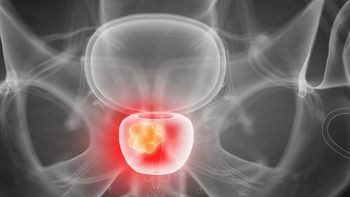
Prostate Cancer
Latest News

Latest Videos

CME Content
More News

"If your practice does not closely monitor patients and send them for early salvage radiotherapy when their PSA is 0.1 or 0.2 ng/mL, it is likely that adjuvant radiotherapy is superior," Daniel E. Spratt, MD, writes.

Christopher P. Evans, MD, and J. Brantley Thrasher, MD, conclude an in-depth discussion on active surveillance in men with low-risk prostate cancer.

In this video, Samuel J. Peretsman, MD, also discusses his experience with robotic prostatectomy following HIFU.

Christopher P. Evans, MD, discusses his active surveillance protocol with J. Brantley Thrasher, MD.

FoundationOneLiquid CDx will identify HRR alterations, such as BRCA1, BRCA2, and ATM, that make a patient eligible for olaparib.

“Metastatic prostate cancer is a complex cancer with marked inter- and intrapatient heterogeneity; therapy development must focus on the totality of disease biology,” said Maha Hussain, MD.

68Ga-PSMA Cerenkov luminescence imaging accurately assessed surgical margins during radical prostatectomy.

The approval was based on the PROfound trial, in which olaparib reduced the risk of death by 31% compared with abiraterone acetate or enzalutamide.

“[Patients]… need to understand what they’re gaining and what they’re giving up,” says Samuel J. Peretsman, MD, in this video.

PSA monitoring and early salvage therapy appear to be safest in these patients.

The study showed the risk of metastasis and mortality was not higher for African American men on active surveillance compared with non-Hispanic white men on active surveillance.

Samuel J. Peretsman, MD, explains how he incorporated HIFU into his practice.

A new trial is exploring whether CLARIX CORD 1K, a cryopreserved umbilical cord allograft, can contribute to a faster return of erectile function and urinary continence after robot-assisted radical prostatectomy.

If confirmed, the results could facilitate personalized treatment for African American men with prostate cancer.

The miR Sentinel PCC4 Assay is a non-invasive test that has achieved sensitivity and specificity rates above 90% for both detecting and classifying prostate tumors.

Drs. Navin C. Shah and Vladimir Ioffe share their insight on the Urology Times September 2020 Cover Story, “PSA Screening in Prostate Cancer—The Controversy Continues.”

Short-term outcomes suggest feasibility of active surveillance for men carrying germline DNA repair gene mutations.

The researchers hope their findings can help deliver precision medicine to African American men with prostate cancer.

The intervention led to a significant reduction in urologists' opioid prescribing after prostatectomy and nephrectomy.

Transperineal targeted biopsy with electromagnetic-tracking fusion technology is low risk and detects clinically significant prostate cancer as well as the transrectal fusion-guided approach, investigators report.

Adding the PLK1 inhibitor to abiraterone acetate and prednisone led to disease control in patients showing initial signs of progression on abiraterone.

Although the overall incidence of prostate cancer has declined, the percentage of patients with metastatic disease at diagnosis has increased over the last decade.

The technique also led to better preservation of anatomical structures around the urethra and achieved a low rate of positive surgical margins.

Study explores impact of clinical and access factors on racial disparities in prostatectomy outcomes
When adjusting for only age and year of diagnosis, the mortality rate was 51% higher for Black versus White patients receiving the procedure; however, when the model adjusted for all clinical and nonclinical factors, this survival disparity dropped to 20%.

The immunotherapy was also associated with fewer emergency department visits than either of the androgen pathway receptor inhibitors.









